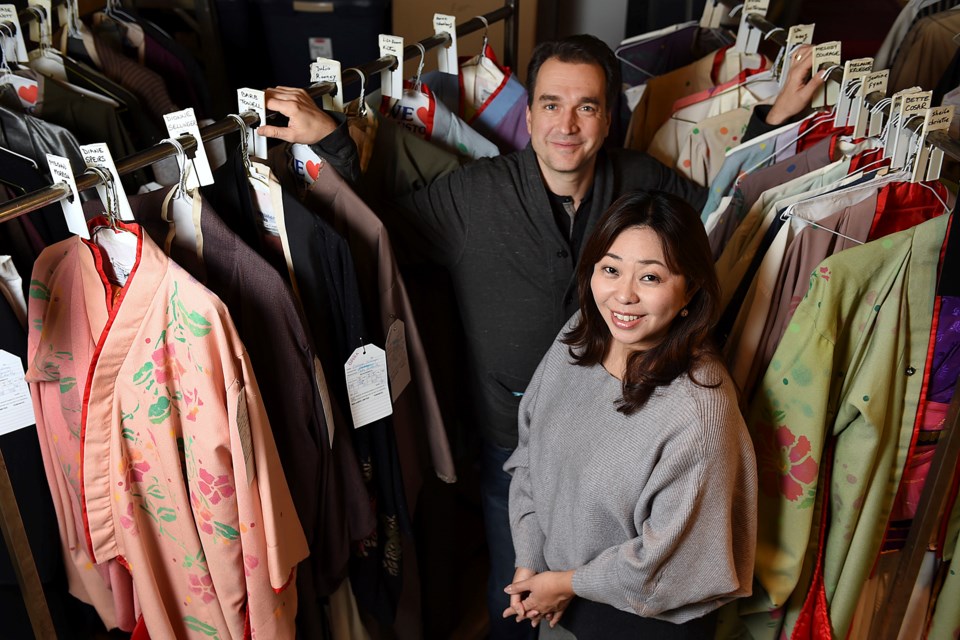The very first time Leslie Dala conducted the opera Madama Butterfly, he noticed it: a kind of Puccini code talking to him from the score.
Like Robert Langdon on a Da Vinci quest, Dala leans forward excitedly in his chair in the Vancouver Opera meeting room as he describes the moment:
“The last time I did this, I discovered what I think is a sort of morse code in one section in Act 3, where Butterfly says to Suzuki, ‘Ma non viene più. Te l’han detto?’ [He told you that he is not coming back?].”
In the haunting silence of the orchestra, they answer her question with two notes, two plucks that seem to say what goes unspoken.
“It’s his kind of joke,” he continues. “[Suzuki] doesn’t say anything, but the orchestra does.”
Dala grins at his obscure revelation and Mihoko Kinoshita, seated next to him on break from rehearsals for the lead role of Cio-Cio-San (Butterfly), is agape. The storied soprano knows exactly what he is referring to, and starts humming the notes over and over in confirmation, like a veritable Japanese Sophie Neveu.
It’s an altogether joyous, fascinating interaction. One that can only take place between two musical savants, sharing the experience of staging one of opera’s most beloved classics.
Written in 1903 by Italian composer Giacomo Puccini, Madama Butterfly tells the exotic, heartbreaking tale of a young Japanese geisha who falls for an American naval officer. While the 15-year-old Butterfly remains faithfully committed to their marriage in her home of Nagasaki, the older Pinkerton is only briefly enchanted and entertained, eventually abandoning her for his real life and returning casually years later to collect their child.
Like many operas, Butterfly still tells a familiarly dramatic tale of star-crossed love, leading to transcendently romantic duets and soul-shattering conclusions, but it does so with the grit and verismo, or realness, that defined much of Puccini’s career. It is also loaded with the soaring melodies and memorable arias that make the maestro a household name.
Furthermore, this is the 11th time Vancouver Opera has staged the tragic love story – tied for the most of any opera in the history of the 55-year-old organization – and for good reason. Not only is Madama Butterfly a wonderful introduction to the art form for newcomers, it is also widely considered Puccini’s masterpiece.
"Puccini himself considered it his favourite piece, and Butterfly was his favourite heroine up unto his death. So if he thought that…,” Dala laughs. “But it’s hard to compare. Bohème is such an incredible piece, Turandot is such an incredible piece, Tosca…It’s like there’s no shortage. But I have to say for me personally, this piece lands in a way that is somehow the most profound, the deepest.”
It is Kinoshita’s masterpiece – the role she has performed more often and to more acclaim than any other in her career – as well. In fact, Kinoshita – who first appeared in Vancouver as Butterfly in 2010 – is regarded as one of the greatest Cio-Cio-Sans in the world. So much so that Tom Wright, Van Opera’s director of artistic planning, revealed in conversation that one of Vancouver Opera’s biggest donors specifically offered financial help to ensure her return for this one.
“For me it’s such a pleasure to work with Mihoko because she’s done this so many times and she’s so musical and so instinctive,” praises Dala, as she listens on. “To me she is Butterfly – she inhabits that world.”
• Vancouver Opera’s Madama Butterfly runs for six performances, March 5-13. Tickets from $45; VancouverOpera.ca.


